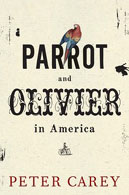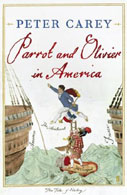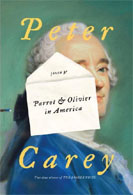 |
Parrot and Olivier in America Peter Carey Penguin Books 2009 |
[This novel has been shortlisted for the 2010 Commonwealth Writers' Prize in the South East Asia and Pacific region, and longlisted for the 2010 Miles Franklin Award.]
From the publisher's page
Olivier is a young aristocrat, one of an endangered species born in France just after the Revolution. Parrot, the son of an itinerant English printer, wanted to be an artist but has ended up in middle age as a servant.
When Olivier sets sail for the New World - ostensibly to study its prisons, but in reality to avoid yet another revolution - Parrot is sent with him, as spy, protector, foe and foil. Through their adventures with women and money, incarceration and democracy, writing and painting, they make an unlikely pair. But where better for unlikely things to flourish than in the glorious, brand-new experiment, America?
A dazzlingly inventive reimagining of Alexis de Tocqueville's famous journey, Parrot and Olivier in America brilliantly evokes the Old World colliding with the New. Above all, it is a wildly funny, tender portrait of two men who come to form an almost impossible friendship, and a completely improbable work of art.
Reviews
James Bradley in "The Australian" : "...Parrot and Olivier in America manages to marry the urgency of Theft to the precision of Carey's earlier fiction. The result is a book that in its best moments achieves a sort of rackety joyousness...Nonetheless, it would be a mistake to confuse the book's sprawl or occasional lack of focus with a lack of control...Because for all that it is a book that often seems most alive when at its wildest and most inventive, it is also a book keenly aware of the ironies and contradictions at its centre...Carey may be a republican, and a passionate believer in the possibilities of Australia and Australian culture, but the spirit of his fiction is too restless, too contrarian to have much truck with the sentimental pieties of Australian nationalism. Like Kate Kelly in True History of the Kelly Gang dismissing Ned's and Joe's stories about the brave fight against the English back in Ireland as sentimental nonsense about brutal murderers, Carey's fiction repeatedly evinces a profound ambivalence about the self-deceptions of colonial culture, about the dishonesty at its core, and its celebration of its mediocrities as virtues."
Andrew Reimer in "The Sydney Morning Herald": "Parrot and Olivier in America sounds like the title of a children's book, and there is indeed something irresistibly youthful about the zing and bounce of this picaresque tale spanning three continents. This is Peter Carey at his best: playful, extravagant, even rambling at times, yet fully in control. It is sometimes hard to know where these adventures are heading, yet they all finish up going somewhere meaningful and satisfying...Parrot and Olivier in America is a tour de force, a wonderfully dizzying succession of adventures and vivid, at times caricatured, characters executed with great panache. Telling this intricate story is shared by Olivier and Parrot in alternate chapters, a clumsy device in some hands but highly successful in Carey's."
Ursula K. Le Guin in "The Guardian": "..exactly as its title promises, the book is about Parrot and Olivier in America; but it's not about America. Its picture of the coarse, young United States of Andrew Jackson - based largely on De Tocqueville, of course, and I think also on later observers such as Frances Trollope and Charles Dickens - is entertaining, if predictable...The narrative proceeds in leaps and bounds, sometimes with a hop backwards, omitting connections, giving an impression above all, perhaps, of confusion - confusion of event and motive, incomprehension, a vast drama without structure. The language is vivid, forceful and poetic (though I wish Olivier's aristocratic locution was free of grammatical blunders such as 'of she toward whom', 'of she who I affected to be unaware of', 'to he who I intended to make my father-in-law'). There are terrific set pieces, such as the burning of the forgers' house - moments Dickensian in their vividness. Themes of fire and burning run through the story. An early kind of bicycle appears, with much discussion and even an illustration, and later on an American bicycle enters the tale. Are there hidden significances? I don't know. It's a dazzling, entertaining novel. Should one ask for more?"
John Preston in "The Telegraph": "There are certain things you know you're going to get from a Peter Carey novel: scale of ambition, narrative boldness, apparently inexhaustible imagination and fizzingly exuberant imagery. Even by his standards Carey's 11th novel, Parrot and Olivier in America, has all these in abundance...Like Carey's 2001 Man Booker Prize-winner, True History of the Kelly Gang, Parrot and Olivier in America has an epic historical sweep to it. Yet for all the novel's virtues, the book can't muster the same emotional impact as its predecessor. In part, this is due to the nature of the story. However, there are other factors, too. The friendship between the two men comes to feel increasingly contrived. Sparring away with one another, Parrot and Olivier work wonderfully well, but once they've buried their differences, they tend to lose definition as well as edge."
Philip Hensher in "The Monthly": "Parrot and Olivier is in many ways beautifully done; it is written with all its author's celebrated mastery of style; it is organised very neatly around sets of ideas, including original and reproduction, master and servant; it has the surface appearance of great energy. But nothing human in it much engaged me, and I found myself reading on for the pleasure of the sentences only. It amounts to an exquisite divertissement but, as the book goes on, the suspicion grows that the author is diverting himself much more than the reader. After all, divertissements were written in Carey's chosen period with the full intention that the audience would carry on conversations simultaneously, relegating the artistic invention to the background of their attention."
Andrew Taylor in "The Independent": "Carey's novel builds a picture of America, his own adopted homeland, seen through a glass darkly from a fictional version of the 1830s. Its mainspring is the dialogue that develops between Parrot and Olivier. Parrot is pragmatic, a natural republican, and resourceful. Olivier, a faintly ridiculous child of the ancien regime, judges what he sees and whom he meets by aristocratic and European criteria; and yet is too intelligent, and in some ways too generous, not to ignore the virtues of both this brash, alien country and his irredeemably vulgar fellow traveller...This is one of the strongest points of the novel: the reader never quite loses sympathy with Parrot or Olivier. Another of its virtues is Carey's wonderfully witty and visual prose, which springs surprise after surprise on the reader. A third is that his version of 1830s America allows him to comment on its modern counterpart: he touches lightly on, among many other things, sub-prime mortgages, an inflated art market and demagogic politicians. "
Short Notices
Mark Rubbo of "Readings": "In this marvellous book, Carey will no doubt antagonise and provoke some critics: firstly for his departure from an Australian theme and secondly for his unabashed admiration for the principles of the American democratic tradition. In spite (or because) of this, it is a grand, magisterial story, full of great characters and stories. Above all, it is one of his most important books and a major development in his writing career."
Chris Flynn on the "Falcom vs. Monkey" weblog: "Parrot and Olivier in America is one of Peter Carey's finest achievements, elevating him far above the rest of literature's maddening crowd. There's even a nod to the Aussies in the form of a devilishly funny early map of the colony. The man deserves his head on a stamp."
Interviews
Carey is interviewed by John Freedman of "Granta" magazine about the book.
Tom Leonard in "The Telegraph".
Brian Appleyard in "The Times".
Rosanna Greenstreet in "The Guardian".
Ramona Kaval on ABC Radio National's "The Book Show".
"The Thought Fox", the Faber publishing house weblog.
Other
Carey discusses the novel on Penguin TV, via YouTube.
The UK and US covers of the novel are as follows:
 |  |
| UK cover | US cover |
